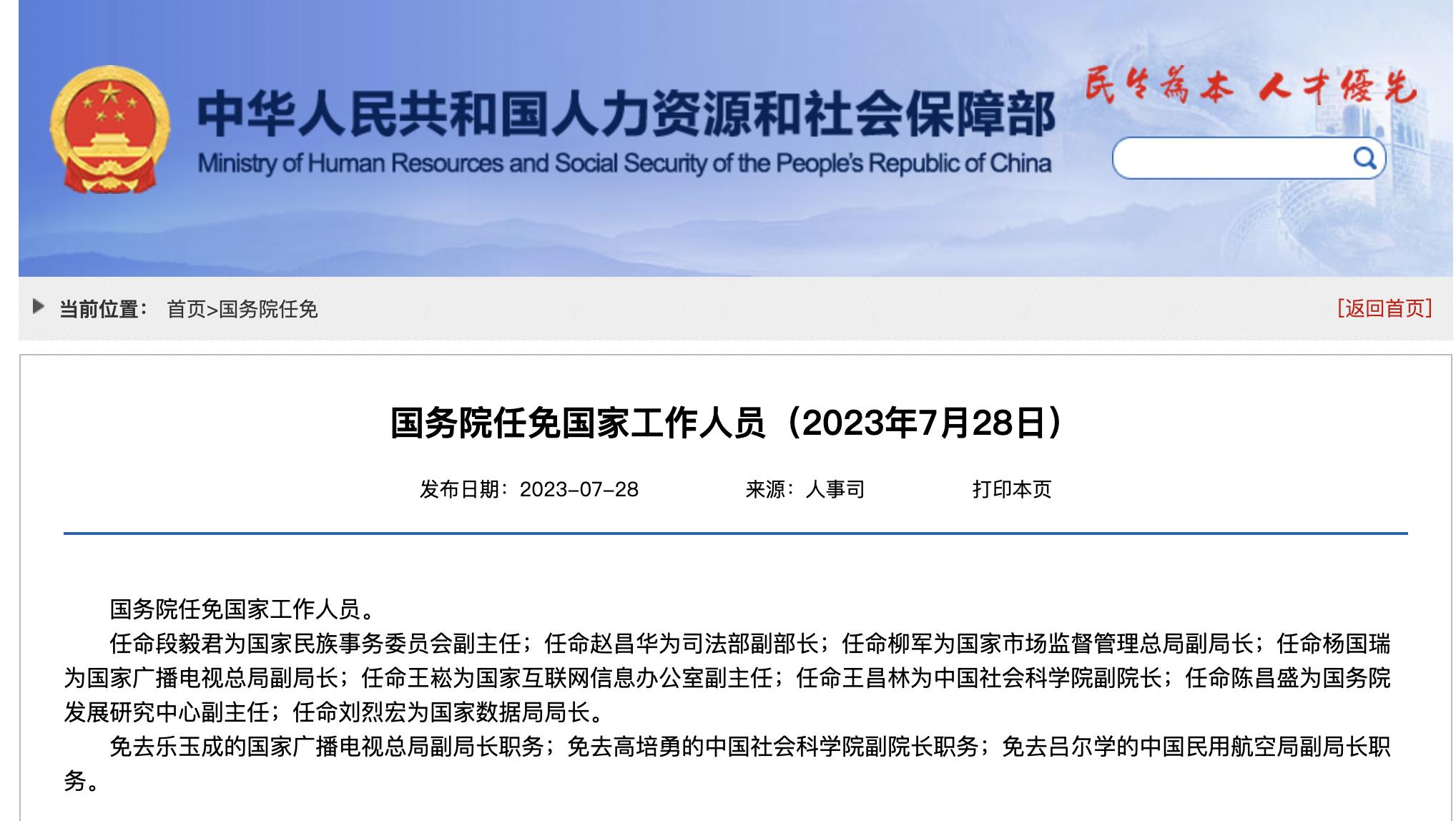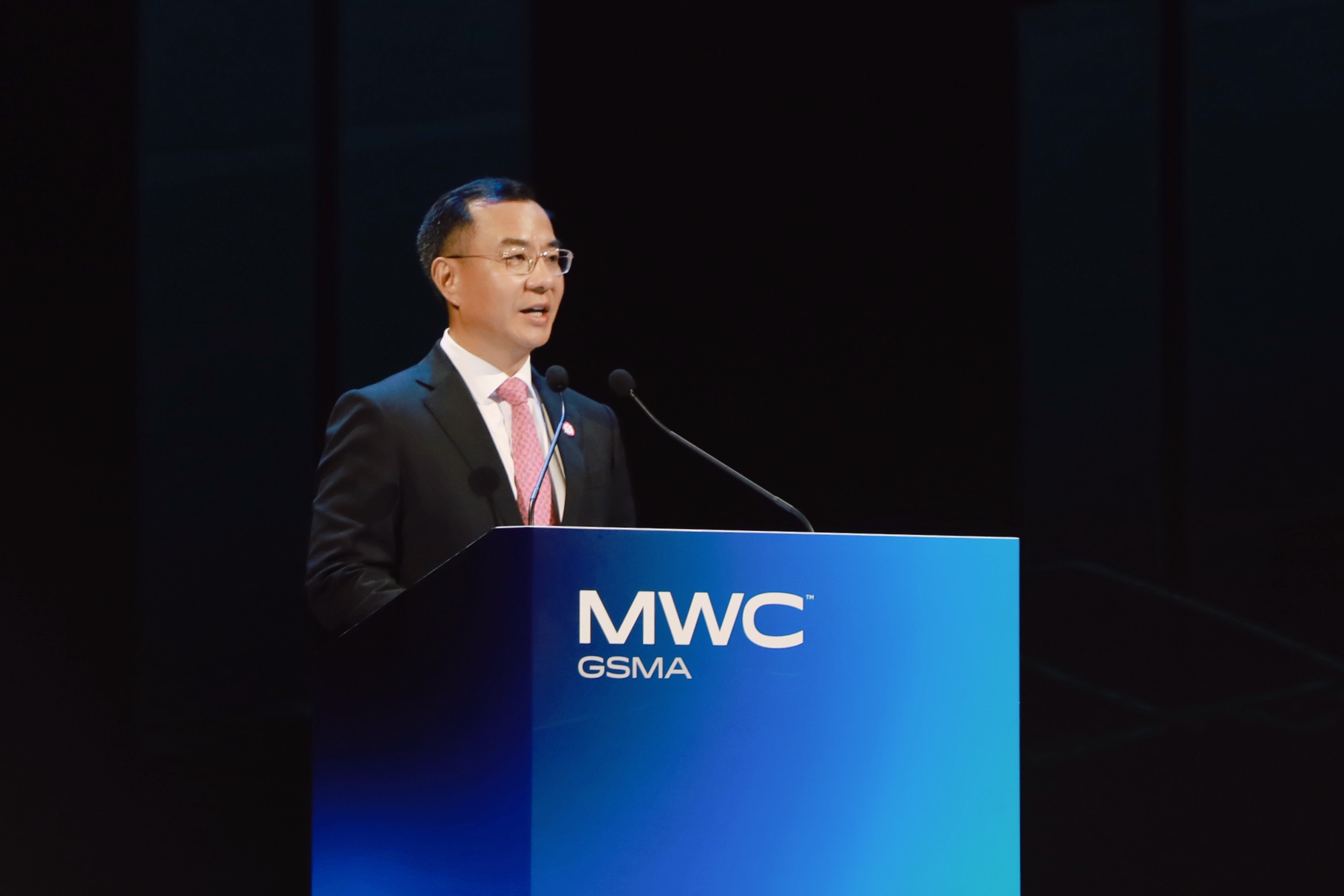
Official website, Ministry of Human Resources and Social Security.
It has been less than two years (686 days) since the Vice Minister of the Ministry of Industry and Information Technology was transferred to the post of Chairman of China Unicom, and Liu Liehong, who is about to turn 55, will take up his new post.
On July 28th, according to Ministry of Human Resources and Social Security news, Liu Liehong was appointed as the first director of the National Data Bureau.
In March this year, the Central Committee of the Communist Party of China and the State Council issued the "Party and State Institutional Reform Plan" and proposed the establishment of a national data bureau. The National Data Bureau, managed by the National Development and Reform Commission, is responsible for coordinating and promoting the construction of the basic data system, coordinating the integration, sharing, development and utilization of data resources, and coordinating and promoting the functions of digital China, digital economy and digital society planning and construction.
At present, the National Bureau of Data has not been listed. According to a person familiar with the matter, the selection of the director means that the leadership team of the National Data Bureau has been clear.

Liu Liehong was at the 2023 Shanghai Mobile World Congress (2023 MWC Shanghai).
The fourth job adjustment in five years
According to public information, Liu Liehong was born in October 1968. He is a native of Chengdu, Sichuan Province. He has a postgraduate degree and a doctorate in management. He enjoys the "special government allowance of the State Council" and is an alternate member of the 20th Central Committee. Liu Liehong has more than 30 years of experience in the field of information and communication. He started his career as an assistant engineer in the Ministry of Machinery and Electronics Industry in 1990, then became the deputy general manager of China Electronics Technology Corporation in 2004, and was promoted to the director and general manager of China Electronics and Information Industry Corporation five years later. Eight years later, in 2017, Liu Liehong became the director and general manager of China Electronics Technology Group Co., Ltd.
The new National Bureau of Data is Liu Liehong’s fourth job adjustment in five years.
In July 2018, 50-year-old Liu Liehong entered the official career from the enterprise, and was transferred from China Electronics Technology Group to the Office of the Central Cyber Security and Informatization Committee (hereinafter referred to as the "Central Network Information Office") as the deputy director of the Central Network Information Office and the National Internet Information Office. Deputy director. In June 2020, Liu Liehong served as the Deputy Minister of the Ministry of Industry and Information Technology (hereinafter referred to as the "Ministry of Industry and Information Technology"). He was the youngest deputy minister of the Ministry of Industry and Information Technology at that time, mainly in charge of the Information and Communication Development Department, the Information and Communication Administration, the Network Security Administration, the Retired Cadre Bureau, the Local Communication Administration, the China Information and Communication Research Institute, and the Emergency Communication Support Center. In August, 2021, Liu Liehong took charge of China Unicom as the chairman and party secretary.
Liu Liehong’s performance experience in the Ministry of Industry and Information Technology, the Central Network Information Office, operators and other central ministries and state-owned enterprises is closely related to the functions of the National Data Bureau. In the government responsibility system of building digital China, the National Data Bureau has integrated five macro-management responsibilities undertaken by the Central Network Information Office, such as studying and drawing up a digital China construction plan, coordinating and promoting the informationization of public services and social governance, coordinating and promoting the construction of smart cities, coordinating the development, utilization and sharing of important national information resources, and promoting the cross-industry and inter-departmental interconnection of information resources, as well as the responsibilities undertaken by the National Development and Reform Commission, such as coordinating and promoting the development of digital economy, organizing and implementing the national big data strategy, promoting the construction of data element infrastructure, and promoting the layout of digital infrastructure.
CITIC Securities once concluded in the research report that the National Data Bureau has been functionally integrated into the functions of coordinating the development of digital economy by various departments of the Network Information Office and planning the overall digital economy by the National Development and Reform Commission. CITIC Securities predicts that in the future, the National Bureau of Data will optimize the design of digital China assessment baton, including quantitative assessment of digital infrastructure, enhanced application of government data, and integration of digital and real data into local pilot projects.
Make big data one of Unicom’s "main responsibilities"
In fact, just a month ago, at the opening ceremony of the 2023 Shanghai Mobile World Congress (2023 MWC Shanghai), Liu Liehong, the chairman of China Unicom, won the 2023 Asia Mobile Industry Outstanding Contribution Award. The Asia Mobile Industry Outstanding Contribution Award is an award independently selected by the Global Mobile Communications Association (GSMA), which enjoys a great reputation in the communication industry in Asia.
Tao Xujun, digital director of Nomura Research Institute, pointed out that in the past one or two years, China Unicom has gained new market growth points in the government and enterprise market through ICT and digitalization, which has proved a feasible digital market road for the whole industry and provided a successful practice for operators to change from communication infrastructure service providers to digital infrastructure and capacity service providers.
During Liu Liehong’s tenure as the head, China Unicom’s performance grew rapidly. According to the company’s financial report, in 2022, China Unicom achieved an operating income of 354.9 billion yuan, an increase of 8.3% year-on-year, which reached a new high in nearly nine years. Among them, the revenue of industrial Internet business including data center, cloud, Internet of Things and big data was 70.5 billion yuan, up 28.6% year-on-year, and the proportion of revenue also increased from 12.4% in 2019 to 22.1% in 2022.
According to the latest quarterly report of China Unicom in 2023, its quarterly income was 97.222 billion yuan, up 9.2% year-on-year, and the growth rate reached the high level in the same period in the past decade. Its main business income was 86.115 billion yuan, up 6.1% year-on-year, and its net profit returned to its mother was 2.266 billion yuan, up 11.6% year-on-year.
During his tenure, Liu Liehong made big data one of the "main businesses" of China Unicom. According to the information disclosed in the annual report, China Unicom’s big data business will achieve about 50% revenue growth every year from 2021 to 2022, and its revenue will reach 4 billion yuan by 2022. At the beginning of 2022, China Unicom issued "Action Plan for Innovative Application of Big Data", which clearly pointed out that in 2022, it is necessary to basically build a technical base with complete technical system and independently controllable product systems for data governance and data security applications, and enter the first echelon of government big data service providers. At the end of 2022, China Unicom announced at the partner conference that it had built 15 ministries’ big data platforms and 12 provincial-level big data platforms to serve the construction of digital government in 31 provinces.
"Liu Liehong has held important positions in the Network Information Office and the Ministry of Industry and Information Technology. In addition, he has practical experience in core enterprises of digital economy such as China Electronics and China Unicom. Especially when he was in charge of China Unicom, it was also the development stage of China Unicom from communication hardware to data application. This experience vision helps him to promote the country’s better opening of data elements, optimize the rational allocation of data elements, and promote the combination with traditional elements. In particular, the core of the digital integration and industrial digital transformation that is now emphasized is to sort out through data elements. " Wang Yong, deputy director of Tsinghua University Economic Research Institute and president of Tsinghua University Minsheng Economic Research Institute, said in an interview with the media.
关于作者